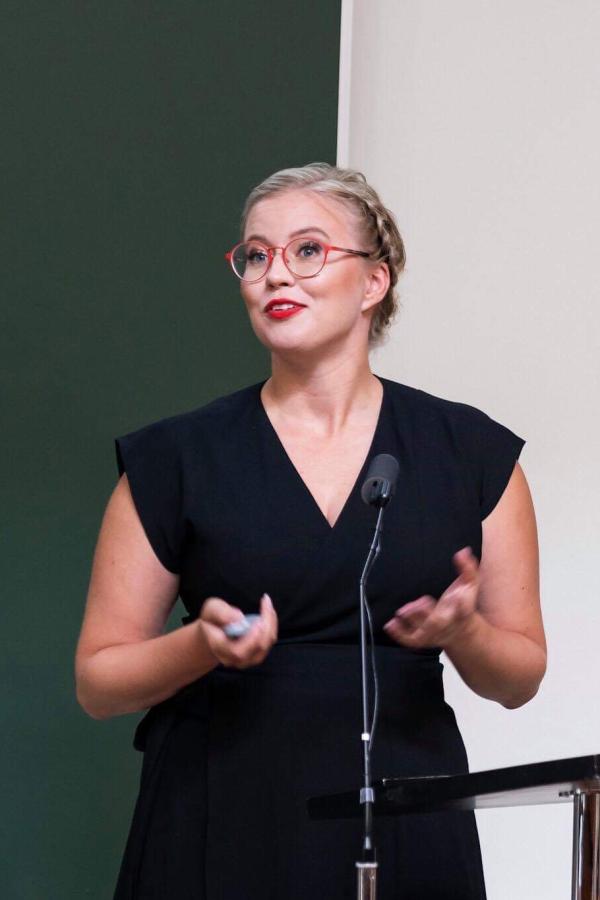Business ideas and freedom draw women to entrepreneurship – yet only one-third of entrepreneurs are women

Various factors encourage people towards the path of an entrepreneur. Many find the most rewarding factor to be the ability to impact your work and manage your own time and activities.
Carita Eklund, a researcher at the University of Vaasa, is particularly interested in entrepreneurship among women. In her latest study, she explored why women become entrepreneurs in the United States and Finland. What has encouraged them to set up a business, what kind of support they have received and what types of challenges they have faced?
– The most common motives are freedom or a business idea. These are the two most typical themes. The need to get a job and earn money are other key factors, she explains.
Inspiration from freedom and flexible day-to-day activities
Setting up a business allows you to work according to your schedule and regardless of time and place. Contrary to widely held belief, this also provides freedom for family life, hobbies and other duties alongside running the business.
– Entrepreneurship can be a wonderful way to harmonise your family and working life. Being able to organise your activities to your liking brings a certain flexibility to daily living, Carita says.
– A family can be a hindrance to entrepreneurship, but it can also be a driving force, she adds.
For women in working life, it is extremely important for work and leisure to blend in a way that leaves enough energy for both. The meaningfulness of the work and the opportunities for more engagement with the family are appreciated in entrepreneurship.
Establishing a business can also provide financial independence. When you set up your own business, you can even earn more than in paid employment and have ownership of the output. At the same time, you can build the career path to your liking.
Realising one’s vision brings satisfaction
According to a study by Statistics Finland, female entrepreneurs are more likely to be excited about and satisfied with their work than their male counterparts. The study also found that more than half of female entrepreneurs were very satisfied with their work, whereas only about one-third of women in paid employment felt the same.
Carita Eklund’s study on female entrepreneurship supports this thought. As an entrepreneur, you can build your business idea and create a company that reflects your values and passions. This can help you find a meaningful and rewarding job that aligns with your lifestyle.
– Many feel that being an entrepreneur doesn’t feel like work when you have a passion for what you do, and it’s also nicer to go to work, says Carita.
When you set up your own business, you can even earn more than in paid employment and have ownership of the output. At the same time, you can build the career path to your liking.

Certain fields are more prominent among female entrepreneurs
In certain fields, entrepreneurship may be the only and most profitable alternative for practising the profession.
Finland is truly a nation of micro-entrepreneurs as about 69 percent of entrepreneurs are sole traders. The number is even higher among female entrepreneurs at 73 percent. The most prominent vocations among self-employed women are cultural and handicrafts professions as well as various health, beauty and wellness professions.
The focus on specific fields is also evidenced by Carita Eklund’s study.
– Female entrepreneurs are more likely to start service-sector companies around healthcare, education or restaurant industry. This is due to their experience and expertise in these fields. On the other hand, entrepreneurship in artistic or cultural fields is a natural continuation and the only way to work in your area of specialisation.
Opportunity to make a difference in society
Entrepreneurs have the opportunity to impact society and affect changes in their communities. Many can find solutions to social issues and offer new ways to help others through their business.
For example, women in the social welfare and healthcare field may feel inadequate if they want to handle their work as well as possible but it is impossible within the time allotted. This can spark the idea to consider other options and personal solutions.
Carita Eklund’s study highlighted the need to do something for the community among the motives for women to become entrepreneurs.
– It is a common conception that entrepreneurs only think about themselves. Yet, my study showed that people think about the community. The study involved amazing entrepreneurs with a business idea that was new in the area and that they genuinely wanted to use for the benefit of others.
Resilience, tolerance to pressure and problem-solving skills
The idea that women are not as capable as men when it comes to management, business and entrepreneurship is still prevalent in society. This stereotype may prevent women from considering entrepreneurship as an alternative to career development. It is also said that women are more cautious with risks, which are unavoidable when setting up a business.
Katja Rajala, chair of the Women Entrepreneurs of Finland, business coach and serial entrepreneur of almost three decades, describes resilience, self-management skills and the ability to tolerate uncertainty as the key traits of an entrepreneur.
– All entrepreneurs can be faced with a variety of challenges regardless of gender. The challenges experienced by female entrepreneurs are often related to family leave arrangements or, in female-dominated fields, arrangements and costs related to the parenthood of employees, which can cause significant issues for business. Moreover, challenges related to business financing persist, she describes.
In Carita Eklund’s study, entrepreneurship was described as a leap of faith.
– Many of my interviewees were most concerned about their financial situation. Some had difficulties securing their income or funding for acquiring a business. Others considered whether they would be able to get customers. Competence, the ability to cope and the opinions of others on the profitability of the business were identified as other concerns. That said, even these aspects did not impact the interviewees’ decision to establish a business. They decided to start a career as entrepreneurs and were willing to work for it.
Katja Rajala says that she has faced many challenging situations during her entrepreneurship, which have forced her to build her resilience, pressure tolerance and problem-solving skills.
– As an entrepreneur, I have fallen seriously ill, had children, studied, experienced bankruptcy, got divorced and tackled a wide range of day-to-day problems. For me, quite a few of the common risks of entrepreneurs have been realised. Still, life eventually carries you past even the most severe difficulties and, fortunately, entrepreneurship has also been a significant source of joy, learning and experiences of success.
"Today, anyone can establish a business, but women should be encouraged to think bigger."

The courage to think bigger
In 2021, there were 215 600 people with a self-employed person’s pension insurance policy in Finland, fewer than one-third of whom were women. As such, they are a minority, and more are needed.
In Katja Rajala’s opinion, it is important to talk about female entrepreneurship since women are still too scarce among managers and entrepreneurs and their business activities entail characteristics that should be considered better than before. Women in our country are highly educated, and this potential alone should also be more efficiently utilised through entrepreneurship.
– The labour market in Finland remains quite segregated. This is also mirrored by entrepreneurship in the fields in which especially women set up businesses. For example, the decisions that the wellbeing services counties make on multi-provider arrangements significantly impact female-owned businesses and their growth opportunities.
Both Katja Rajala and Carita Eklund think that entrepreneurship benefits regional vitality. Female entrepreneurs are an important part of the economy and society, and their businesses promote employment, economic growth and innovative ideas that can lead to new products, services and developments.
– Entrepreneurship in general should be talked about more in terms of the added value entrepreneurs bring to our society by taking risks to generate employment, services and tax income. Successful female entrepreneurs in various fields should also be highlighted more. We need to provide examples and leverage entrepreneurial education to provide women with paths towards entrepreneurship.
According to Carita Eklund, female entrepreneurs are excellent role models for others. Seeing women make it in the business world can encourage others to reach for success.
– The impact of role models on work careers has been studied a great deal, and many female business owners have benefited from a close role model, especially during the first years of entrepreneurship.
– It should all start with highlighting entrepreneurship and business education in every area starting from early childhood education and teaching. Today, anyone can establish a business, but women should be encouraged to think bigger, Katja Rajala says.
Carita Eklund thinks along the same lines.
–I wonder how we could encourage everyone to take more risks. If an idea doesn’t fly, then it doesn’t fly. But what if the next one does?

